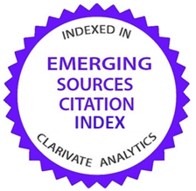Algunas consideraciones sobre política exterior y de defensa. El caso de Costa Rica
DOI:
https://doi.org/10.21830/19006586.225Palabras clave:
política exterior, política de defensa, seguridad, políticas públicas, Costa RicaResumen
Tradicionalmente las políticas exterior y de defensa se conciben y estudian como políticas públicas separadas y, generalmente, formuladas a partir de criterios y parámetros diferentes. Si bien se reconoce que se trata de dos políticas sui generis, porque se formulan a lo interno de los Estados, su implementación se produce en el ámbito externo, y por tanto responde a la forma de cómo los “decisores” (gestores con capacidad de decisión) conciben su rol como actores internacionales, y la percepción que tengan de las interacciones con otros Estados. Esto último evidencia que tienen cosas en común. Así, al profundizar en su análisis se comprueba que la política exterior y la política de defensa están entrelazadas, y responden al interés de sobrevivir y progresar que tiene el Estado. Por supuesto, tienen diferencias; una utiliza el recurso de la diplomacia y generalmente está basada en las relaciones en tiempos de paz, y la otra recurre a los medios militares y se orienta tanto a tiempos de paz como de guerra.
Descargas
Referencias bibliográficas
Adler, E., and S. Bernstein (2005). Knowledge in Power: the Epistemic Construction of Global Governance. In M. Barnett and R. Duvall (editors). Power in Global Governance. New York; Cambridge University Press. p. 294-318.
PMid:15766294
Ayoob, M. (2005). Security in the Age of Globalization: Separating Appearance from Reality. In E. Aydinli, and J. Rosenau (editors). Globalization, Security, and the Nation-State: Paradigms in Transition. New York: State University of New York Press. p. 9-26.
Baldwin, D. (1997). The Concept of Security. Review of International Studies. 23: 5-26.
https://doi.org/10.1017/S0260210597000053
Barnett, M., and R. Duvall. (2005). Power in Global Governance. In M. Barnett and R. Duvall (editors). Power in Global Governance. New York; Cambridge University Press. Pp. 1-32.
PMid:18521409 PMCid:PMC2395624
Bowman, A. (2005). Policy Implementation. In J. Rabin (editor). Encyclopedia of Public Administration and Public Policy. Boca Raton, FL: Taylor & Francis Group. P. 209-212.
https://doi.org/10.1201/9781420068047.ch45
Burns, N. (2012). Diplomacy returns to US arsenal. The Boston Globe. March, 02. Disponible en: http://www.bostonglobe.com/opinion/2012/03/02/diplomacy-returns arsenal. Revisado 02/ Mar/2012.
Buzan, B. (2005). The Security Dynamics of a 1 + 4 World. In E. Aydinli, and J. Rosenau (editors). Globalization, Security, and the Nation-State: Paradigms in Transition. New York: State University of New York Press. p. 177-198.
Buzan, B. (1991). People, States, and Fear. The National Security Problem in International Relations. Sussex, UK: Wheatsheaf Books.
Buzan, B., and R. Little. (2000). International Systems in World History. Remaking the Study of International Relations. New York; Oxford University Press.
Campbell, D. (1992). Writing Security: United States Foreign Policy and the Politics of Identity. Minneapolis, MN: University of Minnesota Press.
Cantir, C., and J. Kaarbo (2012). Contested Roles and Domestic Politics: Reflections on Role Theory in Foreign Policy Analysis and IR Theory. Foreign Policy Analysis. Volume 8, Issue 1, 5-24.
https://doi.org/10.1111/j.1743-8594.2011.00156.x
Carlsnaes, W. (2003) Foreign Policy. In W. Carlsnaes; T. Risse; and R. Simmons (editors). Handbook of International Relations. London: Sage Publications, p. 331-349.
Cavelty, M.; and E. Brunner. (2007). Introduction: Information, Power, and Security – An Outline of Debates and Implications. In M. Cavelty, V. Mauer, and S. Krishna-Hensel (editors). Power and Security in the Information Age. Investigating the Role of the State in Cyberspace. Hampshire, UK: Ashgate. p. 1-18.
Cavelty, M.; and V. Mauer (2007). Conclusion: The Role of the State in Securing the Information Age – Challenges and Prospects. In M. Cavelty, V. Mauer, and S. Krishna-Hensel (editors). Power and Security in the Information Age. Investigating the Role of the State in Cyberspace. Hampshire, UK: Ashgate. p. 151-162.
Chandler, D. (2010). Neither International nor Global: Rethinking the Problematic Subject of Security. Journal of Critical Globalisation Studies. 3: 89-101.
Clarke, M. (1990). The Foreign Policy System: A Framework for Analysis. In M. Clarke, and B. White (editors). Understanding Foreign Policy. The Foreign Policy Systems Approach. Aldershot, UK: Edward Elgar. p. 27-59.
Eilstrup-Sangiovanni, M. (2009). Varieties of Cooperation: Government Networks in International Security. In M. Kahler (editor). Networked Politics. Agency, Power and Governance. New York: Cornell University Press. p. 194-227.
Hansen, L. (2006). Security as Practice. Discourse Analysis and the Bosnian War. New York: Routledge.
Harnisch, S. (2012). Conceptualizing in the Minefield: Role Theory and Foreign Policy Learning. Foreign Policy Analysis. Volume 8, Issue 1, 47-69.
https://doi.org/10.1111/j.1743-8594.2011.00155.x
Henrikson, A. (2002). Distance and Foreign Policy: A Political Geography Approach. International Political Science Review. Vol. 23, No. 4, 437-466.
https://doi.org/10.1177/0192512102023004007
Herrera, G. (2007). Cyberspace and Sovereignty: Thoughts on Physical Space and Digital Space. In M. Cavelty, V. Mauer, and S. Krishna-Hensel (editors). Power and Security in the Information Age. Investigating the Role of the State in Cyberspace. Hampshire, UK: Ashgate. p. 19-44.
Hurrell, A. (2007). On Global Order. Power, Values, and the Constitution of International Society. New York: Oxford University Press.
https://doi.org/10.1093/acprof:oso/9780199233106.001.0001
Jepperson, R.; A. Wendt; and P. Katzenstein (1996). Norms, Identity, and Culture in National Security. In P. Katzenstein (editor), The Culture of National Security: Norms and Identity in World Politics. New York: Columbia University Press. p. 33-75.
Kahler, M. (2009). Networked Politics: Agency, Power, and Governance. In M. Kahler (editor). Networked Politics. Agency, Power and Governance. New York: Cornell University Press. Pp. 1-20.
Katzenstein, P. (1996). Introduction: Alternative Perspectives on National Security. In P. Katzenstein (editor), The Culture of National Security: Norms and Identity in World Politics. New York: Columbia University Press. p. 1-32.
Kobrin, S. (1998). Back to the Future: Neomedievalism and the Postmodern Digital World Economy. Journal of International Affairs. Vol. 51, No. 2, 361-386.
Kratochwil, F. (1995). Rules, Norms, and Decisions. On the Conditions of Practical and Legal Reasoning in International Relations and Domestic Affairs. New York; Cambridge University Press.
Krotz, U. (2001). National Role Conceptions and Foreign Policies: France and Germany Compared. Working Paper 02.1. Cambridge, MA: Minda de Gunzburg Center for European Studies, Harvard University. Disponible: http://aei.pitt.edu/9291/01/Krotz.pdf; revisado 9 de febrero de 2012.
Leonard, E. (2005). Foreign Policy Analysis. In J. Rabin (editor). Encyclopedia of Public Administration and Public Policy. Boca Raton, FL: Taylor & Francis Group. P. 110-113.
https://doi.org/10.1201/9781420068047.ch23
Lincoln, J.; and P. Lauderdale (1985). A New Defense Policy for Costa Rica: Constructing Reality and the Policy Agenda. Policy Studies Review. November. Vol. 5, No. 2, 220-229.
https://doi.org/10.1111/j.1541-1338.1985.tb00352.x
Mabee, B. (2005). The Globalization of Security. State Power, Security Provision and Legitimacy. Hampshire, UK: Palgrave-Macmillan.
PMCid:PMC1315330
McSweeney, B. (1999). Security, Identity and Interests. A Sociology of International Relations. Cambridge, UK: Cambridge University Press.
https://doi.org/10.1017/CBO9780511491559
Milner, H.; and R. Keohane (1997). Internationalization and Domestic Politics: An Introduction. In R. Keohane and H. Milner (editors). Internationalization and Domestic Politics. Cambridge, UK: Cambridge University Press. p. 3-24.
Ministerio de Defensa (1997). Libro de la Defensa Nacional de Chile 1997. Santiago: Ministerio de Defensa.
Muldoon, J. (2006). The Architecture of Global Governance. An Introduction to the Study of International Organizations. Boulder, CO: Westview Press.
Murillo, C. (2006). Taiwan: Seguridad y defensa en un contexto complejo. Managua: CREI.
Murillo, C. (2008a). Decisiones de política exterior de países peque-os en contextos hegemónicos. Una propuesta teórica de análisis. (Tesis para optar al grado de doctor en Gobierno y Políticas Públicas) San José: Universidad de Costa Rica.
Murillo, C. (2008b). Política Exterior de Países Peque-os. El caso de Costa Rica. Revista Temas de Nuestra América. Núm. 46: 69-89.
Murillo, C. (2011). Regiones, seguridad y Estados frágiles. El caso de Centroamérica (Documento presentado en el curso Strategy and International Security). Washington, D.C.: Center for Hemispheric Defense Studies, National Defense University.
Murray, D.; and P. Viotti (1989). Introduction: Defense Policy in Comparative Perspective. In Murray, D.; and P. Viotti (editors). The Defense Policies of Nations: a comparative study. Maryland: The John Hopkins University Press. p. 3-9.
Nye, J. (2011). The Future of Power. New York: Public Affairs.
Parsons, W. (2001). Public Policy. An Introduction to the Theory and Practice of Policy Analysis. Cheltenham, UK: Edward Elgar.
Rosenau, J. (1997). Along the Domestic-Foreign Frontier. Exploring Governance in a Turbulent World. New York: Cambridge University Press.
https://doi.org/10.1017/CBO9780511549472
Rosenau, J. (2003). Distant Proximities. Dynamics Beyond Globalization. Princeton, NJ: Princeton University Press.
PMCid:PMC179775
Rothschild, E. (1995). What is security? Daedalus. Vol. 124, núm. 3: 53-98.
Schneider, A.; and H. Ingram. (2005). Policy Design. In J. Rabin (editor). Encyclopedia of Public Administration and Public Policy. Boca Raton, FL: Taylor & Francis Group. P. 204-208.
https://doi.org/10.1201/9781420068047.ch44
Schultz, D. (2004). Encyclopedia of Public Administration and Public Policy. New York: Facts On File.
Sikkink, K. (2009). The Power of Networks in International Politics. In M. Kahler (editor). Networked Politics. Agency, Power and Governance. New York: Cornell University Press. p. 228247.
Smith, S. (2001). Foreign Policy Is What States Make of It: Social Construction and International Relations Theory. In V. Kubálková (editor). Foreign Policy in a Constructed World. New York: M. E. Sharpe, p, 15-37.
Sørensen, G. (2005). State Transformation and New Security Dilemmas. In E. Aydinli, and J. Rosenau (editors). Globalization, Security, and the Nation-State: Paradigms in Transition. New York: State University of New York Press. p. 81-98.
PMid:15732271
Steele, B. (2008). Ontological Security in International Relations. Self-Identity and the IR State. New York: Routledge.
https://doi.org/10.1177/0047117808089897
Thies, C. (2012). International Socialization Process vs. Israeli National Role Conceptions: Can Role Theory Integrate IR Theory and Foreign Policy Analysis? Foreign Policy Analysis. Volume 8, Issue 1, 25-46.
https://doi.org/10.1111/j.1743-8594.2011.00170.x
US Department of Defense, (2003). DOD Dictionary of Military and Associated Terms. Washington, D.C.: Joint Chiefs of Staff, Department of Defense.
Viotti, P. (1989). International Relations and the Defense Policies of Nations: International Anarchy and the Common Problem of Security. In Murray, D.; and P. Viotti (editors). The Defense Policies of Nations: a comparative study. Maryland: The John Hopkins University Press. p. 10-22.
Wendt, A. (1999). Social Theory of International Politics. Cambridge, UK: Cambridge University Press.
https://doi.org/10.1017/CBO9780511612183
White, B. (1990). Analysing Foreign Policy: Problems and Approaches. In M. Clarke, and B. White (editors). Understanding Foreign Policy. The Foreign Policy Systems Approach. Aldershot, UK: Edward Elgar, p. 1-26.
Descargas
Publicado
Cómo citar
Número
Sección

| Estadísticas de artículo | |
|---|---|
| Vistas de resúmenes | |
| Vistas de PDF | |
| Descargas de PDF | |
| Vistas de HTML | |
| Otras vistas | |
























